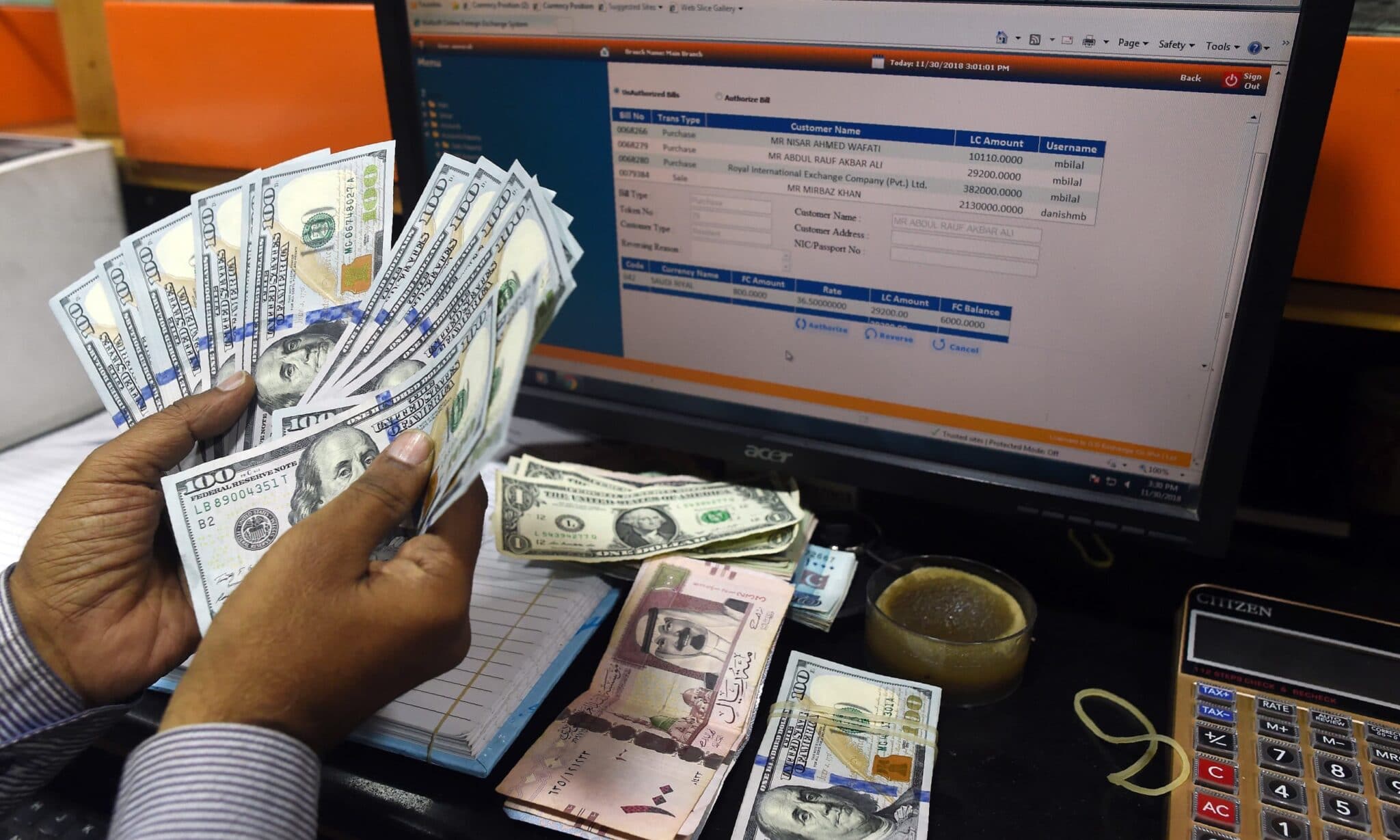The government legally declared that the income tax exemption would be available to the foreign remittances coming through foreign currency accounts of Overseas Money Service Bureaus (MSB), Exchange Companies (ECs) and Money Transfer Operators (MTOs).
The FBR issued circular number 5 of 2021, on the issue of foreign remittances exemption. The FBR has also withdrawn all departmental appeals filed against the taxpayers on the issue of exemption available to foreign remittances.
ALSO READ
The FBR has also directed its field formations to dispose of all cases of the claim of foreign remittances under the lenient interpretation of section 111(4) of the Income Tax Ordinance, 2001.
The FBR’s circular stated that the SBP vide Memorandum dated May 7, 2021, held their ground and have responded to FBR’s observations by stating that “to claim an exemption under the aforementioned clause of ITO, 2001, a taxpayer receiving home remittances” via MSB and ECs “strictly fulfills all the conditions set in section 111(4)(a) of the ITO, 2001.”
The SBP has also gone on to item-wise address the question of fulfillment or non-fulfillment of the four cardinal conditions laid down in the Income Tax Ordinance 2001, under the currently prevailing banking regulations and practices as under: –
- The FBR’s condition is that the amount should be in foreign exchange. The SBP response is that the home remittances amount is received from MSB/ECs in Pakistan in foreign exchange.
- The FBR’s condition is that the amount should be remitted from outside Pakistan through a normal banking channel. The SBP response is that the foreign exchange is received by Pakistani banks in their nostro accounts through the normal banking channel from overseas jurisdictions.
- The FBR’s condition is that the amount should be encashed by a scheduled bank. The SBP response is that the foreign exchange is surrendered (encashed) in the interbank market and home remittances are paid in PKR.
- The FBR’s condition is that the certificate of encashment in respect of the amount should be produced by the concerned bank. The SBP response is that an encashment certificate is issued by a bank that has received foreign exchange from abroad on behalf of the beneficiaries in the matter.
ALSO READ
According to the FBR’s directive to the field formations, the SBP having unequivocally responded to all four critical questions, that is, that foreign exchange ought to originate overseas, must reach and be surrendered to SBP, and transaction should leave a banking trail behind, have been answered affirmatively.
Moreover, the SBP under the Foreign Exchange Regulations Act, 1947, is the institution to attend to all matters pertaining to “dealings in foreign exchange and securities and the import and export of currency. Therefore, the SBP being the frontline regulator of all foreign exchange moving into or outside the country, is in the best position to decide as to whether the necessary legal requirements have been met or not of a particular transaction to be able to avail the benefits cover under tax laws.
Foregoing in view, it is clarified that all cases of the claim of foreign remittances be disposed of by according to lenient interpretation to the conditions stipulated in section 111(4) of the ITO, 2001. Moreover, in order to win the trust of the taxpayers and spare the public resources for more productive use elsewhere, all Departmental appeals filed on the stricto sensu interpretation of the law, be withdrawn immediately, and no further appeals be filed if on all fours of this clarification.
The Board has received representations indicating that the letter of the (tax) law, SBP regulations, and the case law developed over time, stand at opposite poles when it comes to taxation or non-taxation of foreign remittances resulting in the initiation of avoidable tax proceedings, creation of unsustainable tax demand and additional burden for taxpayers.
It is, therefore, imperative that a comprehensive set of instructions — laying bare historical context, de-conflicting policies and regulations of key institutional players, and prescribing a clear-cut roadmap for uniform implementation across the board with least additional compliance cost to the taxpayers, are issued.
ALSO READ
SBP Opens Up New Investment Options For Overseas Pakistanis
The FBR said that controversy has loomed for quite some time as innovations in banking, money transfer mechanisms, and development of newer products for cross-border transactions have outflanked the letter of the law as now Money Services Business (MSBs), Exchange Companies (ECs), and Money Transfer Operators (MTOs) perform almost identical to those of scheduled banks.
In some situations, IRS Field Formations have refused concession vis-à-vis foreign remittances remitted via ECs, that is, Money Gram, Western Union and Ria France etc relying on Appellate Tribunal Inland Revenue’s judgement. It has been held that the afore-mentioned four conditions are mandatory to claim the benefit of foreign remittances under the ITO, 2001.
However, SBP while responding to Federal Tax Ombudsman (FTO)’s memorandum have categorically taken the position that foreign exchange remitted into Pakistan via MSBs, ECs, and MTOs, such as, Western Union, Money Gram and Ria France etc, does constitute “foreign exchange remitted through normal banking channel for all legal purposes”.
The SBPs’ aforementioned position legitimizing remittances via MSBs, ECs, and MTOs, and equating them with “scheduled banks” as laid down in section 111(4) of ITO, 2001, was challenged through a precise reference bearing C.No.1(1)TP/2017(A), dated March 31, 2021, mainly on four grounds.
ALSO READ
Finance Minister Delighted With Pakistan’s Islamic Banking Industry
First, that all four conditions are to be concomitantly fulfilled and that, prima facie, “prefunded non-resident rupee account and the foreign currency account of Overseas Money Service Bureaus (MSB), Exchange Companies (ECs), Money Transfer Operators (MTOs) etc, locally maintained with the Pakistani banks, and the subsequent replenishment through SWIFT cannot substitute the strict conditions of Section 111(4) of the ITO, 2001.”
Second, as per section 2(m) of the SBP Act, 1956, a “scheduled bank” means a bank for the time being included in the list of banks maintained under sub-section (1) of section 37 of the SBP Act, 1956, and that MSBs, ECs and MTOs were not scheduled banks as per section 37(1) read with section 111(4) of the ITO, 2001.
Third, Hon’ble Supreme Court of Pakistan in case law titled as Army Welfare Sugar Mills Ltd. & Others vs. Federation of Pakistan reported and reported as 1992-SCMR- 1652 has laid down a couple of fundamental principles of claiming exemption, namely, that
- the onus of proof is on the one who claims exemption, and
- “a provision relating to grant of tax exemption is to be construed strictly against the person asserting and in favor of the taxing officer”
Fourth, it is for Supreme Court and High Courts to interpret law and not the regulators like SBP to do the same.
In Pakistan, taxation or non-taxation of foreign remittances has historically been in the spotlight both from the tax policy and tax law enforcement perspectives — more so, since the early 1970s. In the wake of workers’ remittances starting to assume a central role in the external sector management over the past few decades, in addition to the Federal Board of Revenue (FBR), and State Bank of Pakistan (SBP), the higher judiciary has also gained significant importance.
The multiplicity of players, their overlapping roles, and lack of systematic coordination mechanisms amongst them — have many a time, led to policy paradigms that are checkered, at best, and conflicting, at worst — with innovations in banking and trans-border money transfer modes and judicial activism confounding the confusion even further.
This conflicting conundrum between policy planks and judicial pronouncements has resulted in serious difficulties for law enforcement by IRS Formations and fallouts for taxpayers in terms of variable and uneven tax treatment meted out across the country, FBR said.
ALSO READ
Rupee Posts Blanket Losses Against the US Dollar Once Again
The Board, of late, has received representations indicating that the letter of the (tax) law, SBP regulations, and the case law developed over time, stand at opposite poles when it comes to taxation or non-taxation of foreign remittances resulting in initiation of avoidable tax proceedings, creation of unsustainable tax demand and additional burden for taxpayers. It is, therefore, imperative that a comprehensive set of instructions — laying bare historical context, de-conflicting policies and regulations of key institutional players, and prescribing a clear-cut roadmap for uniform implementation across the board with least additional compliance cost to the taxpayers, are issued.
The FBR explained that the Income Tax Act, 1922 (“the ITA, 1922”), vide section 4(2) empowered Tax Department to tax foreign remittances in the hands of wife sent by the husband working abroad out of his “untaxed foreign income.” Albeit it was not explicitly laid down, yet impliedly foreign remittances of any nature had to take place through normal banking channels.
At Independence, on “account of exodus of the non-Muslims and influx of refugees into Pakistan, not only that the administrative machinery was dislocated but also that the nation had received an economic blow. There were people who were bringing large sums of money from India and other countries into Pakistan in order to rehabilitate themselves.”
The Government, therefore, decided not to charge any tax on all those amounts which were brought from abroad unless there was evidence to prove that the amounts, in fact, represented income earned via any means in Pakistan or that such amounts were then sent out of Pakistan after September 18, 1949 when Pak Rupee was not devalued.
This conditional tax concession remained available up to 31′ March, 1956 despite the fact that the money was remitted into Pakistan through non-banking channels. Thereafter, instructions were issued under which the amounts that were remitted into Pakistan through the normal banking channels alone could rank for exemption. Circular No. 7 of 1957, was issued to categorically stipulate that w.e.f. April 1, 1956 “concession will be restricted to such remittances of money from abroad only as come through the normal banking channels and enter the foreign exchange control system.” Subsequently, the concession was extended for another couple of years.
Thus, it is clear that after April 1, 1960, only incomes earned abroad by non-resident Pakistanis (NRPs), and remitted into their own accounts through normal banking channels were to be entitled for exemption from tax in Pakistan.
ALSO READ
KP Approves Digital City Project Worth Rs. 1.3 Billion in Haripur
In 1972, the Economic Coordination Committee of the Cabinet (ECC), decided that the “origin of funds remitted from abroad for non-repatriable industrial investment should not be questioned.” A year later, Finance Ordinance, 1973, ended up deleting Section 4(2) of the Income Tax Act, 1922 (“the ITA, 1922”), by implication, expanding the nexus of the term “foreign remittance” to include spouse, parents, and dependent children subject to the condition that the funds had been transferred through “normal banking channels.”
The purpose of this significant change was to encourage the inflow of foreign currency.” Throughout 1970s and 1980s, the Department continued to adopt rather a softer approach to foreign remittances by not taxing them in the hands of spouse or other family members, and by accepting without further questions when claimed as a source against investment, expenditure or purchase of assets.
The FBR explained that the Protection of Economic Reforms Act, 1992 (“the PERA, 1992”) was promulgated as a parallel foreign exchange regulation in Pakistan; it pulverized the pre-existing one. To give effect to the PERA, 1992, clause (6A), Part Schedule to the ITO, 1979 was inserted vide SRO 219(1)/01, dated March 16, 1991, which effectively amnestized “any amount of foreign exchange” deposited in a private foreign currency account (FCA) held with an authorized bank in Pakistan in accordance with SBP’s Foreign Currency Accounts Scheme (FCAS) introduced by the State Bank of Pakistan.” This way, the fine line between foreign currency remitted into Pakistan and the foreign currency deposited into an FCA by purchasing it from the domestic market, completely got blurred.
ALSO READ
Pakistan’s Bank Profits Stay Stable Despite Drop in Net Interest Income
In the same vein, the Finance Ordinance, 2001 ended up inserting sub-section (2A) in section 13 of the ITO, 1979, to amnestize “any amount of foreign exchange remitted from abroad through normal banking channels and got enchased in Pakistan rupees from a scheduled bank and a certificate is produced to that effect from such bank.” Upon promulgation, the ITO, 2001 also carried a part materia provision in sub-section (4) of section 1 1 I to ensure continuation. This provision effectively took out of the equation the residential status of the remitter and the locus of earning of the amount.
Up until 2015, there was no upper limit to avail exemption u/s 111(4) of the ITO, 2001. A limit of Rs.10 million was brought in 2018, which has, later on, been reduced to Rs.5 million vide Finance, Act, 2019. However, this exemption was available subject to fulfillment of four conditions, namely, that
- the remitted amount is in foreign exchange
- the amount is remitted into Pakistan through normal banking channels
- the amount is encashed by a scheduled bank; and
- a certificate of encashment is issued by the bank concerned.

























